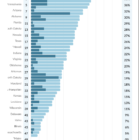
Dear Restorative Justice: Our Student Isn’t Responding
|
What do you do when someone is obdurate and has no interest in taking responsibility or admitting any guilt at all?
Juvenile Justice Information Exchange (https://jjie.org/page/91/)

In late September, Torri was driving down the highway with her 11-year-old son Junior in the back seat when her phone started ringing.
It was the Hamilton County Sheriff’s deputy who worked at Junior’s middle school in Chattanooga, Tennessee. Deputy Arthur Richardson asked Torri where she was. She told him she was on the way to a family birthday dinner at LongHorn Steakhouse.
“He said, ‘Is Junior with you?’” Torri recalled.
Earlier that day, Junior had been accused by other students of making a threat against the school. When Torri had come to pick him up, she’d spoken with Richardson and with administrators, who’d told her he was allowed to return to class the next day. The principal had said she would carry out an investigation then. ProPublica and WPLN are using a nickname for Junior and not including Torri’s last name at the family’s request, to prevent him from being identifiable.
When Richardson called her in the car, Torri immediately felt uneasy. He didn’t say much before hanging up, and she thought about turning around to go home. But she kept driving. When they walked into the restaurant, Torri watched as Junior happily greeted his family.
Soon her phone rang again. It was the deputy. He said he was outside in the strip mall’s parking lot and needed to talk to Junior. Torri called Junior’s stepdad, Kevin Boyer, for extra support, putting him on speaker as she went outside to talk to Richardson. She left Junior with the family, wanting to protect her son for as long as she could ...

What do you do when someone is obdurate and has no interest in taking responsibility or admitting any guilt at all?

The JJIE is eligible for a matching gift opportunity from NewsMatch, a national call-to-action that support nonprofits like us.

Since President Donald Trump appointed her to head the Office of Juvenile Justice and Delinquency Prevention, Administrator Caren Harp has begun reshaping the office with a goal in mind: deregulation.

Over the last decade, jurisdictions across the country have increasingly implemented actuarial tools to aid decision making in the juvenile justice system.

The Trump administration’s Department of Justice (DOJ) and Office of Juvenile Justice and Delinquency Prevention (OJJDP) have instituted policymaking by erasure. These agencies are rolling back juvenile justice data collection, rescinding manuals on best practices and changing policy language.

Juvenile probation professionals know better than most the multitude and complexity of issues our justice-involved youth are facing, and what puts these young men and women at risk for violence. Get IN Chicago, as a youth violence prevention funder working to support the most effective and promising interventions in Chicago, wanted to better understand the youth probation population to inform quality service provision.

The plague of mass incarceration in the United States has captured national attention, with substantial bipartisan support to resolve this crisis. Even as we recognize the problem, however, it is important to think critically about proposed alternatives. There is a growing consensus among developmental researchers and juvenile justice decision-makers that incarceration is particularly damaging to youth.

The highest proportion of juveniles since data collection began in 1997 are being held for status offenses or technical violations, according to the Census of Juveniles in Residential Placement from the Office of Juvenile Justice and Delinquency Prevention.